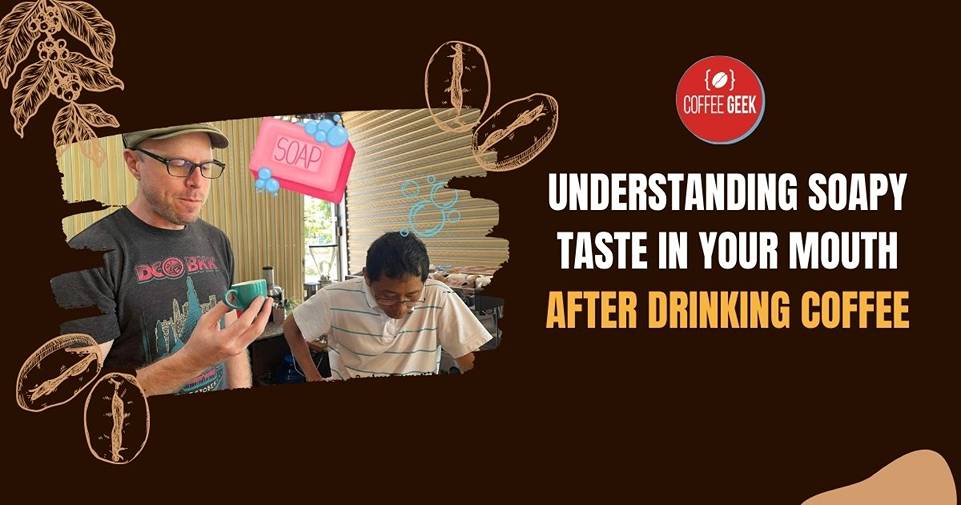Have you recently thought that your mouth tastes like soap after sipping your favorite coffee?
If this experience resonates with you, you may be wondering why suddenly your mouth might produce this unpleasant soapy taste in your mouth.
This article will unravel potential causes of this sensation and offer remedies to avoid this problem.
What Could Cause a Soapy Taste In Mouth After Drinking Coffee?
Several factors could cause that soapy taste in your mouth, including the flavor profile of your coffee, chemical reactions, or even certain oral health indicators.
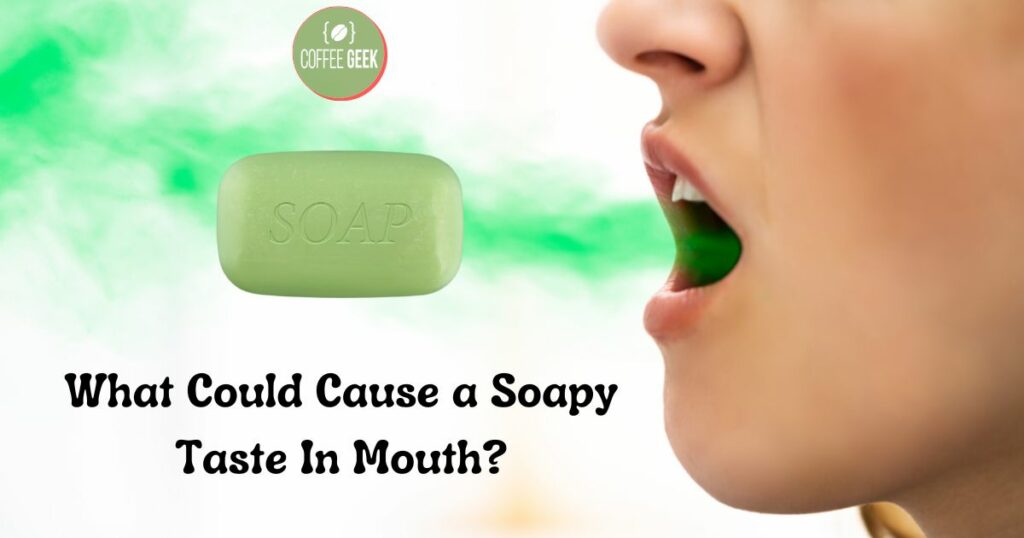
Flavor Profile of Coffee
The first consideration is the flavor of your coffee. If you notice that your coffee tastes subtly bitter and soapy, it could be associated with the coffee beans’ aroma and grind.
Some people might taste soapy notes in certain coffee brands, just like how some people find a soapy flavor in cilantro.
Chemical Reactions
Chemical reactions within your coffee could also cause a soapy taste. For instance, when a contaminant like soap residue from your coffee maker combines with the coffee, it may lead to a soapy taste.
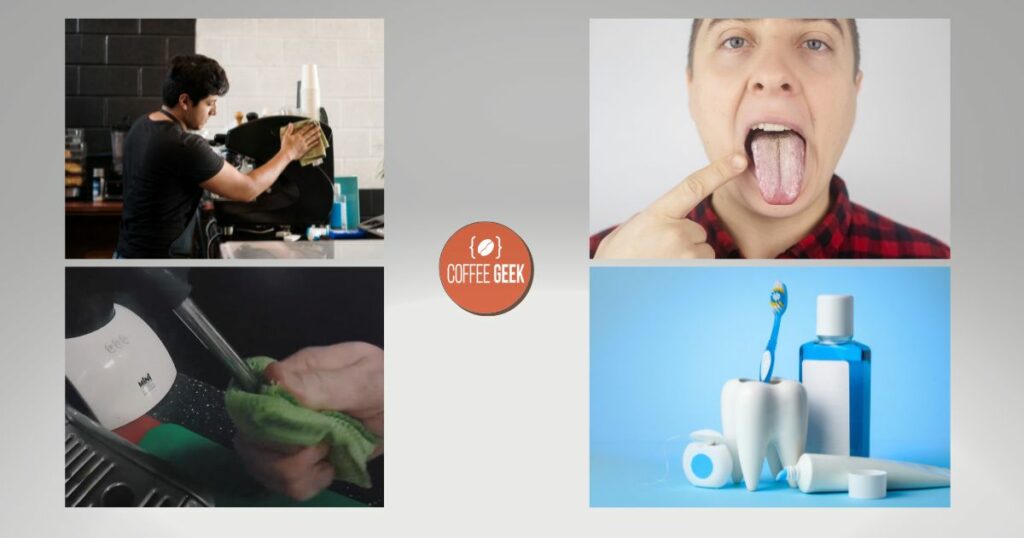
Possible Oral Health Indicators
Your soapy mouth taste could also be a symptom of poor oral hygiene, characterized by plaque buildup.
Using toothpaste and mouth wash, both found in toothpaste together with the residue from particular foods, can sometimes cause a taste in mouth.
Is a Soapy Taste a Symptom of a Health Issue?
Experiencing a soapy taste in your mouth could potentially be a symptom of underlying health issues, especially when accompanied by other symptoms like numbness.
Relating Soapy Taste to Dental Conditions
A soapy mouth taste could be indicative of dental conditions. For instance, a persistent soapy taste could be due to a dry mouth syndrome resulting from poor saliva production or using certain toothpastes and rinses.
Soapy Taste and Medications
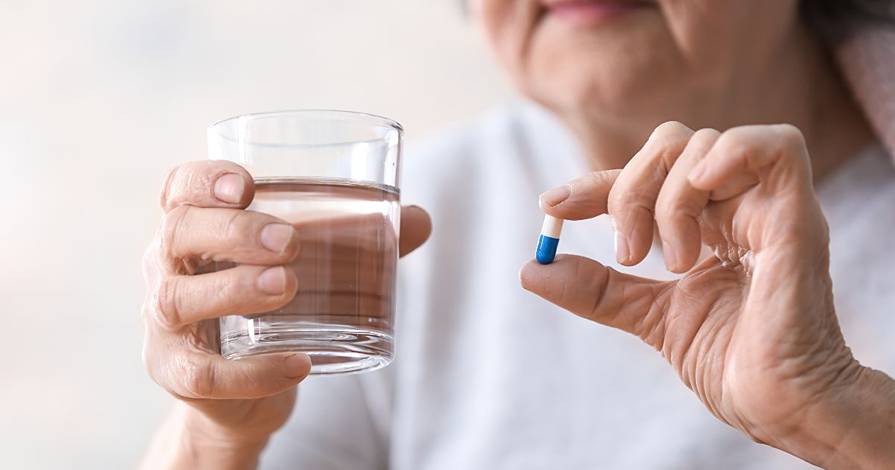
Certain medications could alter taste sensation, causing your mouth to taste like soap or even producing a metallic taste along with the soapy taste.
Possible Links to Poisoning
In rare instances, a soapy taste could signal fluoride poisoning from over-exposure to sodium fluoride, a common compound found in oral hygiene products.
Symptoms of fluoride poisoning include diarrhea, vomiting, and the mouth tasting soapy.
Does Coffee Normally Cause a Taste Soapy In The Mouth?
Generally, drinking coffee should not cause a soapy flavor in your mouth. However, sometimes, certain conditions relating to how the coffee is prepared or stored might cause this unusual taste.
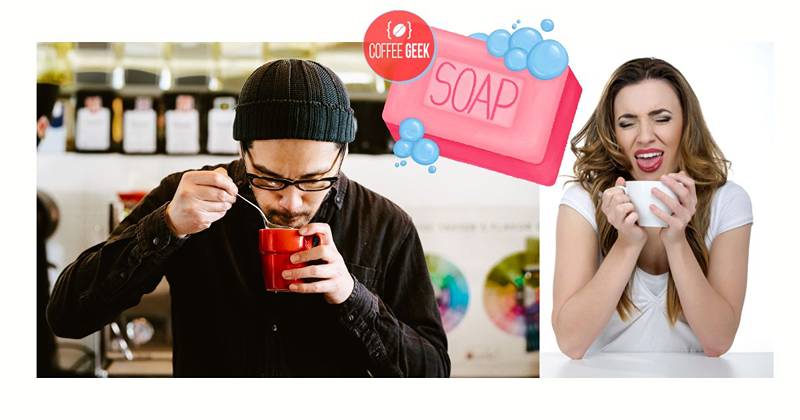
Exploring Coffee Flavors and Tastes
Coffee grinds are complex, containing numerous compounds that contribute to the aroma, flavor, and tastes. Some coffee species or processing methods may contain compounds that some people interpret as soapy.
Effects of Contaminants
Contaminants might affect the coffee’s taste profile, rendering a soapy taste in mouth. This could be from the coffee maker or capsules that haven’t been thoroughly cleaned or from swapped coffee beans.
The Role of Sodium Fluoride
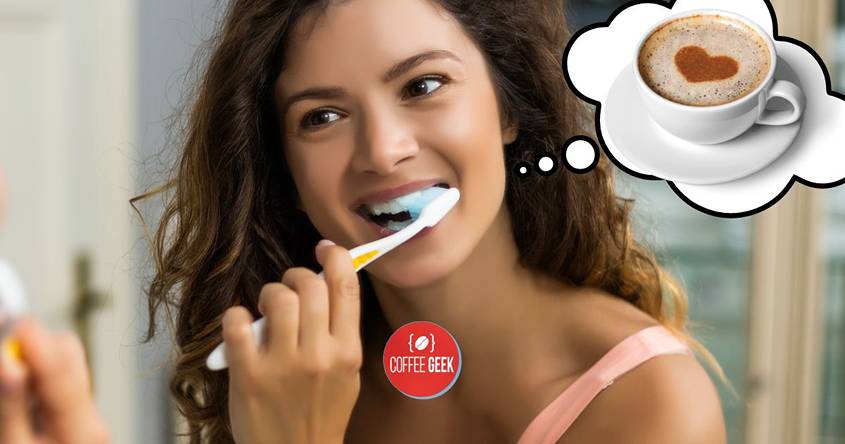
While sodium fluoride is beneficial for oral health, its overuse or overexposure can lead to a soapy mouth.
If you have consumed coffee right after brushing your teeth, this could be the reason why coffee tastes soapy.
| Category | Possible Causes | Solutions |
|---|---|---|
| Coffee Quality | Low-quality coffee beans | Upgrade to higher-quality coffee beans |
| Water Quality | Hard water or water with high mineral content | Use filtered or bottled water for brewing |
| Coffee Brewing | Residue from cleaning agents or soap in coffee maker | Thoroughly clean and rinse the coffee maker |
| Dishwashing Residue | Inadequately rinsed coffee cup or mug | Rinse cups and mugs thoroughly before use |
| Coffee Equipment | Contaminated coffee equipment | Clean and sanitize coffee equipment regularly |
| Oral Hygiene | Toothpaste or mouthwash residue | Rinse mouth thoroughly before drinking coffee |
| Health Conditions | Gastroesophageal reflux disease (GERD) | Consult a healthcare professional for advice |
| Medications | Side effects of certain medications | Discuss with a healthcare professional for alternatives |
How Can You Verify The Cause of The Soapy Taste?
If your coffee has a soapy flavor, several steps can help you verify the cause.
Professionally Evaluation and Testing
If the situation persists, seeking a professional evaluation from a dentist or taste specialist is advised. They can conduct tests to get ready for your tastes and identify potential causes.
Exploring Your Oral Hygiene Routine
Part of the inspection process should include reviewing your oral hygiene routine.
Brushing with certain toothpastes or using mouthwash can cause a soapy mouth taste, especially when combined with drinking coffee.
Inspecting Your Coffee Preparation
Is the soapiness only present when you drink coffee? Then, it could be related to how you store your coffee or clean your coffee maker. Contaminated grinds could be the culprit.
What are the Remedies To Treat Soapy Mouth Taste After Drinking Coffee?
If you’ve narrowed down the cause, here’s how you can remedy the soapy sensation.
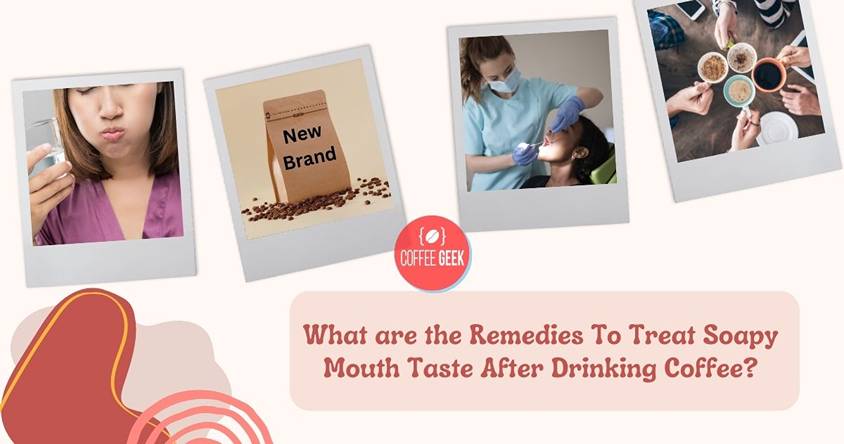
Solutions through Oral Rinse
You may alleviate the soapy mouth taste by performing an oral rinse with clean water to wash away any residual soap-like taste.
Changing Coffee Brands or Preparation
If the coffee beans or their preparation methods are causing the soapy taste, it might be helpful to switch to a different brand or adopt a different coffee preparation method.
When to Seek Medical Consultation
If the soapy taste does not go away, it’s important to seek professional help.
A dentist or doctor can evaluate the case and propose adequate treatments, especially if the soapy taste is a symptom of a more severe underlying issue.
People Also Ask
Why does my mouth taste like soap after drinking coffee?
The feeling of a soapy taste in mouth after drinking coffee may be due to some foods that you’ve consumed alongside the coffee or to overexposure to sodium fluoride from toothpaste or mouthwash.
If the soapy taste persists, it could be a sign of more serious medical conditions and may require medical check.
Coffee alone is not typically known to cause a soapy flavor, so it’s likely due to a combination of various factors.
Is the frequent soapy taste in my mouth a cause for concern?
A soapy or salty taste in your mouth could be an indication of various medical conditions. It can be a symptom of hormone changes, certain medications or even high blood pressure.
However, the condition may also be due to simple causes such as poor oral hygiene. Continually experiencing a soapy taste should definitely be checked out with a healthcare professional.
Are there any treatments available for a soapy mouth taste?
Yes. If poor oral hygiene is the cause, regular brushing and the use of floss can help. Changing your diet to include less salty foods and more sweet flavors may also help distract from the bad taste.
For more persistent or disturbing taste disturbances, please seek medical attention.
What can cause a soapy flavor in my mouth along with other symptoms?
A persisting soapy taste along with other symptoms such as pain, discomfort, or a sour smell from your mouth may indicate a dental decay or infection which needs immediate medical attention.
A soapy taste can also be related to more serious conditions like liver or kidney problems. If it is accompanied by other symptoms, definitely seek professional help.
Can coffee substitute cause my mouth taste like soap?
As a substitute, coffee alternatives may include ingredients that emulate the natural bitterness and sweetness of coffee.
However, some individuals with a certain genetic makeup might perceive these substances differently, which could potentially cause a soapy taste in the mouth.
If you notice that the soapy taste occurs after drinking coffee substitutes, it may be a good idea to switch brands or return to traditional coffee.
Can overexposure to sodium fluoride in my workplace cause a soapy taste in my mouth?
Yes, some people have reported a soapy or salty taste in their mouth after long-term exposure to sodium fluoride or other substances at their workplace.
This could potentially be a sign of toxicity, and the situation should be immediately reported to your employer and poison control.
Moreover, it’s recommended to keep fluid intake high and constantly swap fresh air if working with chemic stuff.
Do genetics play a role in me feeling a soapy taste after drinking coffee?
Certain genetic factors can affect our perception of tastes. In fact, there’s a specific gene variation that makes some people more sensitive to the bitterness in caffeine.
This could potentially make coffee or certain foods taste soapy or overly bitter to those individuals. If your parents or close relatives also report similar peculiar tastes, genetics could be a possible cause.
Can a soapy taste indicate hormonal changes?
Yes, hormonal changes especially during pregnancy or menopause can sometimes cause a soapy taste in the mouth. Hormonal fluctuations can strongly influence our taste and smell perceptions.
If you suspect your soapy taste might be related to hormonal changes, it’s recommended to consult your healthcare provider for further insight.
Does a soapy taste in mouth after eating certain foods, like carrot, indicate bad health?
Not necessarily. A soapy taste after eating carrots, for example, might be due to specific compounds in these foods that clash with the flavors in coffee or perhaps your specific taste sensitivity.
However, a persistent soapy taste regardless of what you eat or drink could be a sign of broader issues with health and warrants a visit to a healthcare professional.
Why can’t I swallow my coffee without feeling a soapy taste?
The soapy taste you’re experiencing might be an aftertaste from your coffee.
While some people might associate the bitterness from coffee with a soapy taste, it can also be the result of drinking low-quality coffee or using a brewing method that doesn’t suit your taste preferences.
It’s also possible that your taste receptors are sensitive to certain compounds in coffee. If the problem persists even after switching your coffee brand or brewing method, it could be time to seek medical advice.

